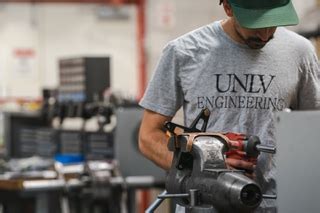Introduction

The University of Nevada, Las Vegas (UNLV) mechanical engineering program stands out as a beacon of academic excellence and cutting-edge research. With its seasoned faculty, state-of-the-art facilities, and industry partnerships, UNLV equips students with the knowledge, skills, and experience necessary to thrive in this dynamic field.
Academic Programs and Research Initiatives
Undergraduate Programs
UNLV offers a Bachelor of Science in Mechanical Engineering that emphasizes foundational principles, design methodologies, and practical applications. Students gain hands-on experience through coursework in:
- Thermodynamics
- Fluid mechanics
- Solid mechanics
- Machine design
- Control systems
Graduate Programs
The graduate program offers a Master of Science and Doctor of Philosophy in Mechanical Engineering. Research areas include:
- Energy conversion and sustainability
- Biomechanics and biomedical devices
- Nanotechnology
- Robotics and automation
- Computational modeling
Faculty and Research Achievements
UNLV’s mechanical engineering faculty are renowned for their expertise and research contributions. They have secured over $100 million in research funding from organizations such as:
- National Science Foundation
- Department of Energy
- National Institutes of Health
Their groundbreaking research has led to publications in top scientific journals and conference proceedings, and has generated numerous patents.
Facilities and Resources
UNLV’s College of Engineering provides mechanical engineering students with exceptional facilities and resources, including:
- Advanced Manufacturing Lab
- Energy Systems Lab
- Fluid Dynamics Lab
- Materials Testing Center
- Robotics and Automation Center
These state-of-the-art facilities enable students to engage in hands-on research and prototyping, fostering innovation and creativity.
Career Opportunities and Industry Partnerships
Graduates of UNLV’s mechanical engineering program are highly sought after by employers in various industries, including:
- Aerospace
- Automotive
- Energy
- Healthcare
- Manufacturing
UNLV has established strong partnerships with industry leaders, providing students with internships, capstone projects, and job opportunities.
Strategies for Success
Effective Learning Strategies
- Attend class regularly and participate actively.
- Review class notes, textbook readings, and assignments.
- Seek help from professors, teaching assistants, or tutors when needed.
- Join study groups or form study partnerships.
- Take advantage of online resources and software.
Tips and Tricks
- Use problem-solving techniques effectively.
- Practice sketching and diagramming to visualize concepts.
- Utilize computational software for simulations and analysis.
- Manage time wisely and prioritize tasks.
- Join relevant clubs and organizations to enhance networking and technical skills.
Applications and Innovations
Emerging Applications
Mechanical engineers are constantly pushing the boundaries of innovation and developing novel applications in areas such as:
- Advanced prosthetics
- Energy-efficient buildings
- Smart manufacturing
- Autonomous vehicles
- Space exploration
Creating a New Word: “Mechanoscience”
To encompass the interdisciplinary nature of mechanical engineering and its potential for groundbreaking applications, we propose the term “mechanoscience.” Mechanoscience combines mechanical engineering with principles from physics, chemistry, biology, and computer science to create innovative solutions to complex problems.
Growth and Projections
The Bureau of Labor Statistics projects strong growth for mechanical engineering jobs over the next decade, with a median annual salary of over $90,000. This highlights the value and relevance of a UNLV mechanical engineering education in a rapidly evolving job market.
Tables
| Table 1: Key Statistics |
|—|—|
| Enrollment (Undergraduate and Graduate): | 550+ |
| Faculty: | 20+ |
| Research Funding: | $100+ million |
| Industry Partners: | 50+ |
| Table 2: Undergraduate Curriculum |
|—|—|
| Thermodynamics: | 3 courses |
| Fluid Mechanics: | 2 courses |
| Solid Mechanics: | 3 courses |
| Machine Design: | 2 courses |
| Control Systems: | 2 courses |
| Table 3: Graduate Degree Programs |
|—|—|
| Master of Science: | 30 credit hours |
| Doctor of Philosophy: | 60 credit hours |
| Research Areas: | Energy, biomechanics, nanotechnology, robotics, computational modeling |
| Table 4: Career Outlook |
|—|—|
| Median Annual Salary: | $90,000+ |
| Projected Job Growth (2019-2029): | 4% |
| High-Demand Industries: | Aerospace, automotive, energy, healthcare, manufacturing |
Conclusion
UNLV’s mechanical engineering program is a vibrant and dynamic environment that fosters excellence in education, research, and innovation. With its exceptional faculty, state-of-the-art facilities, and industry partnerships, UNLV prepares students for success in a rapidly changing workforce. As the field of mechanical engineering continues to evolve and shape the future, UNLV’s graduates will be at the forefront, driving progress and transforming our world.
